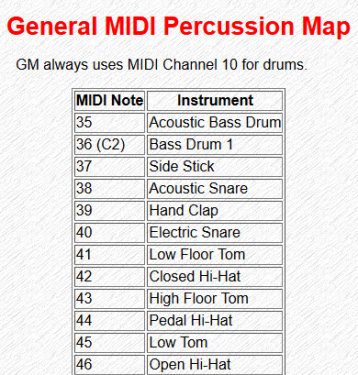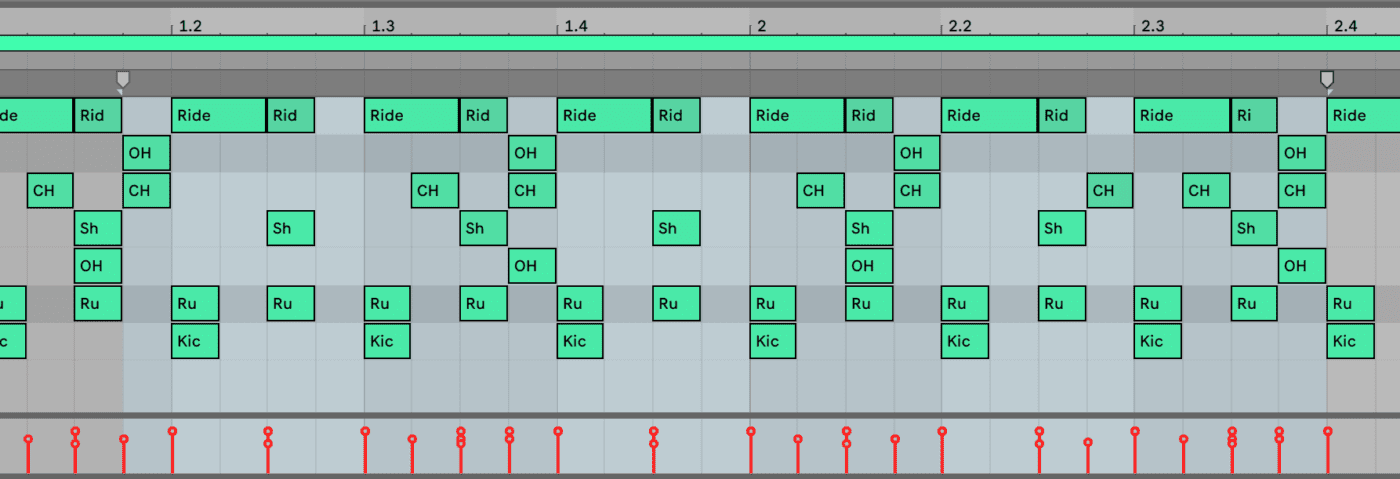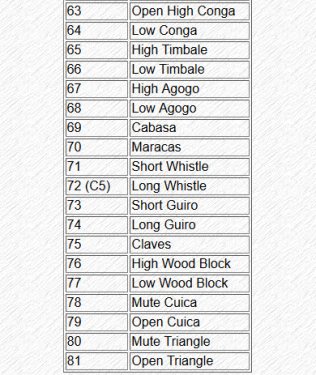ReggaeLicious Midi Files
Funk Hip Hop R&B MIDI Drum Loops. Fusion MIDI Drum Loops. Garage Rock Revival. After months of work I am proud to bring forth another free MIDI collection. This is a collection of Caribbean influenced beats. In studying the different music styles and rhythms of the Caribbean I made 63 different MIDI drum patterns. This pack has beats from Moombahton, Reggaeton, Dancehall, and Reggae. Funk Hip Hop R&B MIDI Drum Loops. $10.95 $19.95. Fusion MIDI Drum Loops. $10.95 $19.95. Garage Rock Revival. $10.95 $19.95.
Buy reggae midi files get your VST instruments ready and make reggae beats like never before. All you have to do is buy the midi files here and use them as shown in the demo on this page below. Most of the styles and patterns you`ve heard in our beats are now available in midi format. It’s as easy as drag and dropping them in your DAW and create your own reggae beats.
Specifications

Free Midi Reggae Drum Patterns
- Acoustic Guitar
- 28 acoustic guitar patterns and basic strums
- Bass
- 40 base patterns and progressions in minor and major chords
- Drums
- 66 drum patterns along with intros and files
- Mute Guitar
- 14 mute guitar patterns in minor and major chords
- Organs
- 5 major bubbling patterns in major and minor chords
- Piano Strums and Rifts
- 7 piano strums and rifts
- Rhodes
- 12 major and minor chords
Work In any DAW

Free Reggae Drum Patterns
To show these four rhythms in their distinctiveness, all the snare drum and hi hat hits in the four rhythms are kept exactly the same. That's because the difference between rhythms in the the quartet has everything to do with the bass drum (kick drum) or 'drop'. Yes, indeed: the 'One Drop' is one of the four we're going to take a look at.
With a BPM set to 130, here are the four foundational Reggae drum rhythms:
STEPPERS
A lot of Electronic Dance Music (EDM) comes with a 'Four On The Floor' or 'Four Drop' drum beat. The bass drum hits every four counts in the 4/4 bar. In Reggae, this rhythm has the name 'Steppers'. It's said to have been invented by Sly Dunbar as part of the Studio Bands of Channel One Studio's in Jamaica, and is often used in UK Roots and DUB as well as contemporary Eurodub and other (online) releases.
It's a powerful, militant rhythm that keeps flowing while in the same time almost instantly catches the attention of people in the dance. This is it:
Plywood hatch autocad. LISTEN: EXAMPLE0003.MP3 | EXAMPLE0003.MID
ONE DROP
The second rhythm is the oldest. It's called the 'One Drop' because, yes, it only has one drop and that drop happens to be just like the snare, on the third count. I'm by far not an expert on Bob Marley and the Wailers' catalogue but I would bet that the One Drop is the most utilized rhythm in especially the 1970's works of that well known Reggae act. Wailers' drummer Carlton Barret has perfectionized his playing of the rhythm to such an extend that I would consider him to be 'Mr. One Drop' where Sly Dunbar is 'Mr. Steppers'.
Because most popular Drum rhythms all start with at least a bas drum hit ('drop') on the first count of a bar, the One Drop has that special feel. Many people do not exactly know how to respond in their dance to the One Drop. Check it out:

LISTEN: EXAMPLE0004.MP3 | EXAMPLE0004.MID

TWO DROP

In the early 1980's, a new style called 'dancehall' came to exist, with as one of it's center the CHANNEL ONE studio's, with their -then contemporary- house band the 'Roots Radics'. Some of my favorite Dub albums are from that period: the legendary Greensleeves Series by Scientist. A rhythm very commonly used in this early style of dance hall, is the Two Drop. It has a bass drum hit on the 1st and the 3rd count of every measure. The feel of the two drop is that of an 'easy does it', while it definitely goes well together with a pumping bass line. Here is the Two drop in sight and sound:
LISTEN: EXAMPLE0005.MP3 | EXAMPLE0005.MID
HALF DROP
The two drop can also be played without putting a bassdrum on the 3rd count: the feel instantly changes, and the beat becomes a bit more 'easy listening'. There is not a real name for this type of beat, but in Jah Roots everytime we talk about the rhythm, we speak about the 'half drop'. Therefore I would like to use that term for the rhythm in these chapters. Here is the 'Half Drop':
LISTEN: EXAMPLE0006.MP3 | EXAMPLE0006.MID
As said earlier, there are variations. One of them is a steppers with a Timbale on the 2nd-2 1/2 and 4rth-4 1/2 count of the bar. Another is a two drop with the first bar having a rim shot doing what the Timbale does in the previous example, where the second bar is a normal two drop. Yet a third one is a steppers with a snare or rim at the half counts after the 2nd and 4th count. You'll get the point: these are variations with obvious knowledge of the four patterns decribed in this chapter.
Another 'golden rule' I won't keep for myself here is this: use just one of the four patterns in your tracks. Where a well known live version of Bob Marley and the Wailers' 'No Woman No Cry' starts with a One Drop only to go over into a Steppers at a later stage can be done, it is very exceptional. I hear 50 examples of bad usage with every 1 good application of changing patterns. Especially with bands that have some need to expose their musical technicalities to an audience that is not waiting for such things but rather want to have a good time with music that keeps flowing.
Reggae Drum Pattern
Things get even worse when you decide to continually ignore these four basic patterns. Ignorance shows, deliberate ignorance is lethal. In other words, do not expect to know how to make Reggae Music by thinking you're Bob Marley or Sly Dunbar and you can come up with your own rhythms just like that. Reggae is a rhythm more than anything else, and rhythms are simply played according to certain patterns.